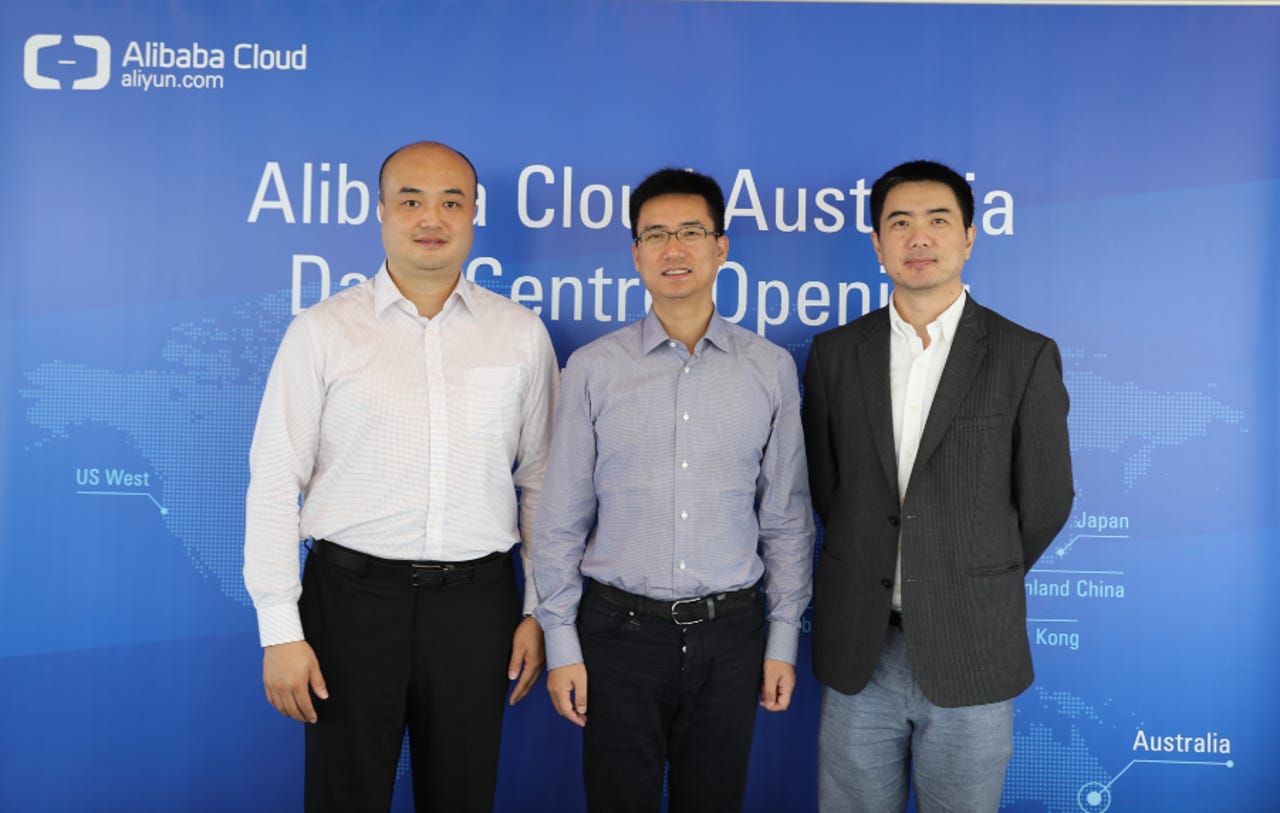Alibaba Cloud opens datacentre in Sydney

Alibaba Cloud, also known as Aliyun, has opened a new datacentre in Sydney to expand its global cloud footprint against existing market players such as Amazon, Microsoft, and Google. It is also looking to expand its local team based out of Sydney and Melbourne.
On November 21, Alibaba Group revealed Sydney to be one of the four locations it has chosen to open datacentres in as part of an $1 billion investment to boost its cloud computing unit.

Raymond Ma, Regional Manager of Alibaba Cloud Australia; Ethan Yu, General Manager of Alibaba Cloud Global; Simon Hu, President of Alibaba Cloud.
Given China is Australia's largest trading partner, the choice was a no-brainer for Alibaba Group.
VP of Alibaba Group Sicheng Yu said Alibaba Cloud will make is easier for Australian small to mid-size enterprises (SMEs) looking to do business in China, given its strength and scale in its native market.
In fact, Alibaba Cloud customers are able to manage their infrastructure in different regions with one global account, Yu said at a press conference in Sydney on Monday.
"We are a real global cloud [platform] in terms of having a global infrastructure covering both the west side and east side," said Yu.
"If an Australian enterprise is looking to set up an ecommerce portal serving their global customer needs, including the Australian local market, the Middle East, and China, what you would typically do is acquire a virtual machine from a cloud vendor, plus the connectivity in those locations, plus the datacentre.
"We would be the perfect vendor to provide this because we have facilities in all these locations."
Alibaba claims to not only bridge the east-west gap for businesses technologically, but also commercially through a program called AliLaunch. Launched in August, AliLaunch helps partners overcome common technological and commercial obstacles that international companies have when expanding into China.
Latest Australian news
Alibaba Cloud's physical presence is still fairly limited compared to Amazon Web Services (AWS), which has 35 availability zones and 13 regions globally, with new regions in Canada, China, Ohio, and the United Kingdom in the process of coming online.
Alibaba Cloud, which became a standalone entity in 2009, offers a growing range of cloud computing solutions in areas such as ecommerce, gaming, logistics, big data, security, and more. It has acquired more than 2.3 million users worldwide since its inception, which includes over 650,000 paying customers ranging from developers and SMEs to big global organisations.
Alibaba Cloud's super computational engine Aspara recently supported the 11.11 online shopping festival during which it processed 175,000 transactions per second on its ecommerce platforms during peak traffic.
"We were able to process that many transactions and such high traffic because we internally have developed a very mature, very flexible, and dynamic middleware system so that we can scale out when the traffic peak comes," said Yu.
While Alibaba Cloud president Simon Hu said in the past that the company was aiming to knock AWS from the top spot within four years, Yu had a slightly different view of the competitive landscape. Yu said that Alibaba Cloud, AWS, Microsoft Azure, and Google Cloud are less competitors and more teammates.
"We team up to compete with on-premises hardware vendors," Yu said. "We think the racing just started because if you look at the workloads ... I would say less than 10 percent of workloads are in the cloud."
The company's initial focus in Australia will be to move small businesses to the cloud.
Yu feels that Australia will be a strong market for Alibaba Cloud, and expects local adoption to be faster than other regions outside of China given the general acceptance of cloud.
Alibaba Cloud usually works with local technology partners when setting up datacentres in new markets to help reduce capital investment risk. The only partner Yu was able to name with an Australian presence was Accenture.
The company will also have a dedicated team in Australia that will help build out Alibaba's local cloud ecosystem.
Prior to Sydney, Alibaba Cloud also opened datacentres in Germany, Japan, and the United Arab Emirates within days of each other. It now has a physical presence in 14 locations around the world including mainland China, Hong Kong, Singapore, and the US.
Alibaba Group reported overall revenue of $5.14 billion in the July-September quarter this year. While 83 percent of Alibaba's revenue is commerce related, its cloud computing group Alibaba Cloud has moved up to 4 percent of overall sales from 3 percent a year ago. Alibaba's cloud revenue surged 130 percent from a year ago to $224 million.